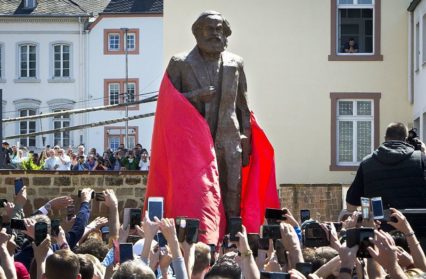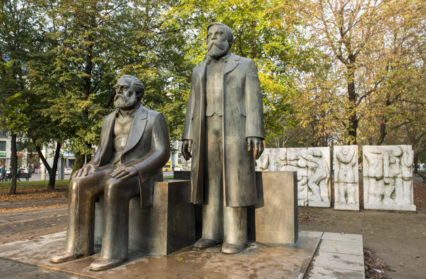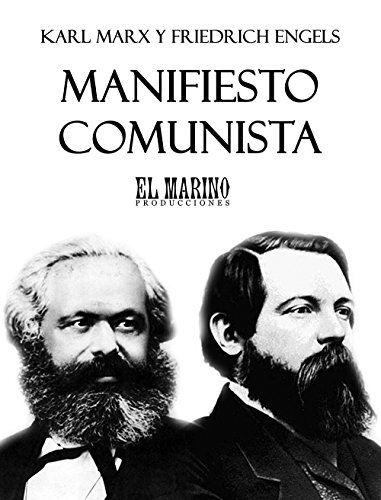As the two hundredth anniversary of the birth of co-author of the Communist Manifesto, Friedrich Engels, is celebrated at various locations around the world, Angharad Price recalls the festivities marking the bicentennial of his friend and fellow author, Karl Marx, at his native city of Trier two years ago.
This essay about Karl Marx and Friedrich Engels is translated from the original Welsh by Lloyd Jones and appears in Anghrard Price’s latest collection of essays, Ymbapuroli.

Trier is a pretty but unassuming city on the banks of the Mosel, surrounded by hills latticed with vineyards, a source of the golden, celebrated wines of the region. Reputedly the oldest city in Germany, known as Augusta Treverorum in Latin, the Roman Empire chose this spot as their northern capital. There are many traces of their occupation: the repaired walls of the basilica, the emperor’s bathhouse, the amphitheatre and the looming bulk of the Porta Nigra which darkens one end of the main street.
More recently, Trier can claim the honour of being the birthplace of Karl Marx, who was born there on 5 May 1818. Two years ago the city became a focal point for global celebrations to mark his bicentennial, and I was fortunate enough to be there as the world paid tribute to the philosopher and economist whose ideas influenced many nations and political structures. The most famous of his revolutionary tracts, the Communist Manifesto (1848) and Das Kapital (1867), formed the basis of the labour movement and both are listed by UNESCO as World Heritage documents.
The official programme for the celebrations at Trier listed some 600 events discussing and analysing his work, spread over the year, and involving large-scale exhibitions, lectures, talks, films, walking tours, theatrical performances (Marx! Love! Revolution!), writing squads, poetry slams, treasure hunts, cooking sessions, cabarets, and even musicals (Come Back, Karl Marx! Ein lustiges Rockmusical).
That’s not how things used to be. A quarter of a century ago I was spending a year as a student at Trier University, living on campus. In a student café one day, on the lookout for posters to adorn the walls of my rather bare room, I saw just what I needed: a big black and white poster of Karl Marx. He was, after all, a local lad, I admired his ideas, and (in hindsight) there was something about the width of his brow that reminded me of my father back home. So I called the city’s Visitor Centre and requested a poster of Herr Marx. But the woman behind the desk became rather uncomfortable, blushing and casting sidelong glances at her colleague. The other woman squinted at me, and stepping closer informed me in no uncertain terms that they ‘didn’t stock that sort of thing here’.
It would be no exaggeration to say that the Catholic, conservative Trier I knew in 1992 was thoroughly ashamed of Karl Marx. His birthplace on the Brückenstraße, between the market square and Aldi, was a modest museum, but seldom made a fuss of. And when – around about the time I was there – a motion was put forward to change the name of Trier University to Karl-Marx-Universität, the staff of the Business School and the Law Faculty threatened to resign en masse.
Three years earlier, at the end of 1989, the Berlin Wall had fallen and the Communist regimes of Eastern Europe overturned. Within twelve months East and West Germany were reunited, and by the time I left Trier in the summer of 1993, I had friends who had grown up on both sides of the wall – but who’d gone to university in a united Germany. But even then, despite the general optimism, the East Germans I knew had mixed feelings about the fall of the iron curtain. This wasn’t just a sentimental longing for a former life (patronisingly labelled Ostalgie later on), but a realisation that there had been losses as well as gains in adopting western capitalism, and that life ‘over here’ wasn’t all milk and honey either. In Trier itself, however, the name of Karl Marx, father of Communism, was anathema.

You can imagine my surprise, twenty-five years later, to discover that his home town planned to celebrate his bicentennial amid great pomp and circumstance. When the official programme, with its bright red cover, came in the post, my surprise turned to incredulity. There was nothing for it but to accept the invitation of my friends, Frank and Bettina, and go and witness events with my own eyes.
So at one o’clock on 5 May 2018, I stepped beneath the dark portal of the Porta Nigra just in time to see the unveiling of a huge statue of Karl Marx – a mere stone’s throw from the Visitor Centre where I’d encountered such contempt years before. Dozens of television cameras and journalists swarmed around the podium, hundreds of people were either swinging bright red flags or filming the event on their mobile phones, and scores of policemen were standing guard. The statue was a gift from the Chinese government, which had commissioned the work from the foremost sculptor in the People’s Republic, Wu Weishan.
There were lengthy speeches by prominent politicians and dignitaries, including Jean-Paul Juncker, President of the European Commission, as well as Chinese diplomats, and the square was filled with cheers when the 15-foot bronze statue appeared from beneath its red silken veil (the scene can be viewed on YouTube). For the rest of the afternoon, people from all over the world took it in turns to be photographed at the feet of the great master.
But there were protests, too: against Marx himself, against Communism, against China, and against Trier itself for accepting the Chinese statue at all. The most striking of these were the defenders of Falun Gong practitioners, who, it was claimed, were being arrested and tortured by the Chinese state, and subjected to forced live-organ harvesting. Complicating matters further were the rumours that their peaceful but highly effective protests around town were funded by the CIA.
But it was Marx himself who was the centre of attention on that sunny and memorable afternoon. It beggared belief. His iconic visage could be seen everywhere: on postcards, mugs, fridge magnets and corkscrews; on clothes in shop windows and on streetside beer steins; Karl Marx biscuits, cakes and high-quality chocolates were being nibbled all over the place. The merchants of Trier were cashing in. Members of Trier’s present-day Marx families (none related) were portrayed on sheet-like banners above the streets whilst beneath them kindergarten infants engaged in treasure hunts, seeking small Marxian heads as if they were Easter eggs. The biggest shock of all was that the area immediately surrounding his birthplace had been renamed Karl-Marx-District, and featured traffic lights with a little red Karl, arms outstretched, to halt pedestrians, and a ‘walking’ Karl in green to indicate they could go.
Four of Trier’s largest museums had created space for bicentennial exhibitions, including, somewhat unexpectedly, the Museum am Dom at the Catholic Cathedral. The high point for me was the magnificent exhibition of Marx’s life and times at the Simeonstift Museum, where I had the privilege of listening to the curator, Elizabeth Dühr, discussing not only the contents of this fine exhibition but also the two-year process of assembling it.

The Trier of his childhood had played a key part in Marx’s political development. His forefathers, maternal and paternal, had been rabbis, but his own father was an ambitious lawyer who had converted to Christianity, changing his name from the Jewish ‘Hirschel’ to the more socially acceptable ‘Heinrich’. Trier at the turn of the nineteenth century was not a conservative city. Indeed, it was regarded as the most troublesome and rebellious city in Prussia. Annexed by France in Napoleonic times, life in Trier had been influenced by the radical ideas of the code civil, which included religious tolerance, the freedom of the press, and constitutional rights for the individual. The city had been reluctant to relinquish these reforms when it fell under Imperial Prussian rule in 1815, three years before Marx was born.
As a child, Marx witnessed people living in dire poverty in his native town, their plight worsened when Prussia passed a law prohibiting the collecting of firewood from communal land, an age-old tradition that had kept the poor from starvation in winter (his father was one of the lawyers who attempted, usually unsuccessfully, to defend those accused of stealing what was now deemed to be ‘private property’). During his teenage years, he became heavily influenced by his headmaster, Hugo Wyttenbach, founder of the Casino Club where Trier’s most enlightened intellectuals discussed important issues of the day. At the same time, Marx also came into close contact with the liberal family of Baron Ludwig von Westphalen, whose daughter, Jenny, was to become Marx’s wife. Jenny, herself a political activist, remained loyal to her husband’s ideals throughout their long years of troubled exile, and it was good to see her getting due recognition in this exhibition.
From Trier, Marx attended a series of universities (Bonn, Berlin, Jena), upsetting his family by neglecting his studies in law, running up huge debts, getting drunk, duelling and fighting in the streets. He made some (unsuccessful) attempts at writing novels and poetry, and increasingly engaged with radical political activists, including the Young Hegelians. Inspired by Hegelian dialectics and the atheism of Feuerbach, he began to form his own materialist world view, finally leading him to the conviction that the world had to be not only understood in its contradictions and paradoxes but also revolutionised in practical terms.
Despite having written a doctorate on the Greek philosopher Epicurus, Marx, openly critical of the Prussian authorities, had no hope of securing a place for himself in academia. He threw himself into journalism, becoming a vocal contributor to the liberal Rheinische Zeitung. Within a few months he’d been made one of its editors and through his defiant and provocative editorials on the political and economic matters of the day moved the paper towards a revolutionary-democratic position. The paper was twice closed down by state censors, and Marx himself, identified by the authorities as a standard-bearer of revolutionary tendencies, was finally forced into lifelong exile: first to Paris, then to Brussels, and ultimately London, where he and Jenny would spend the rest of their lives.
It was during this time that his friendship with Friedrich Engels deepened, a Manchester-based German social economist who shared Marx’s interests in international economics and social revolution, and who also provided much-needed financial support to the Marx family. But despite Friedrich Engels’ aid, they led a penurious existence in Dean Street, Soho, while Marx – a loving but often absent parent – spent his days at the British Library formulating his economic theories, or attempting to put the quarrelsome Communist League on a firm footing. Meanwhile, Jenny was forced to pawn all her family heirlooms. They lived in dire poverty. Four of their children died young, leaving only three daughters to carry on their father’s legacy: Jennychen (little Jenny), Laura and Eleanor.

When Karl Marx’s, co-author of the Communist Manifesto with Friedrich Engel’s circumstances improved in the 1860s, following a series of bequests, the family was finally able to move into a comfortable bourgeois house in Maitland Park. But Marx, the great economist, wasn’t great with money, spending freely on rather unproletarian luxuries such as champagne and claret, Havana cigars, family holidays by the sea in Ramsgate, private education for his daughters, as well as arranging a grand ball in their honour with up to fifty guests. He even played the stock exchange. ‘Whenever he did get his hands on a fistful of sterling,’ writes Francis Wheen in his biography of Marx, ‘he spent recklessly, with no thought for the morrow’. It’s hard to imagine anyone less suited to the stringent demands of Communism in practice, nor indeed anyone who would have railed more vehemently against authority (proletarian or otherwise). Certainly, Karl Marx portrayed in the Simeonstift exhibition was a complex character, fiery, stubborn and intolerant on the one hand, but affectionate, hypersensitive, and surprisingly lovable on the other.
A rather different exhibition at the Karl-Marx-Haus in the Brückenstraße concentrated on Marx’s ideas and their reception globally. As his theories evolved into mass movements, simplification and distortion were inevitable. Marx had had an ambiguous relationship with his followers from the start – further proof of his intransigence, perhaps, but also an indication of his fear of misinterpretation (when he learnt of the activities of a group of firebrand Marxists in France, he told Engels adamantly: ‘One thing’s for sure – I’m not a Marxist!’). History has shown that his misgivings were well-founded. In the century and a half since the publication of Das Kapital, his name has been linked to some of the worst atrocities of the twentieth century, and his theories used to justify the murder of millions – in China, the Soviet Union, Cambodia, and other countries – along with unimaginable political and personal oppression. And there’s no doubt Marx would have been appalled by deeds carried out in the name of his corrupted theories. In the words of Francis Wheen: ‘The bastard creeds espoused by Stalin, Mao or Kim Il Sung treated his works rather as modern Christians use the Old Testament: much of it simply ignored or discarded, while a few resonant slogans are wrenched out of context [ … ] then cited as apparently divine justification for the most brutal inhumanities’.
Inside the Karl-Marx-Haus I became witness to the complex nature of Marx’s legacy. Chinese dignitaries were lining up to be photographed standing next to the Marx statue in the atrium. But when I was spotted taking a photograph of them, a man was sent after me and I was promptly ordered to ‘delete the photos, delete the photos’ (in old thrillers he would have ripped the film from my camera). I was closely watched for the remainder of my visit, including, tellingly, when we were all reading with sympathy about Marx’s battles with state censorship.
The exhibition in the Karl-Marx-Haus tried very hard to draw a line between Marx’s writings and the totalitarian regimes spawned by them. Certainly, many of his theories were too ambiguous, equivocal and incomplete to provide a solid basis for any practicable system, resulting from his continuing dialectical engagement with the inheritance of the industrial revolution. The exhibition showed how Marx constantly edited and re-edited his work, and (as shown also in Gareth Stedman Jones’ study, Karl Marx: Greatness and Illusion), it was stressed how crucial Engels’ role had been in interpreting and disseminating his friend’s ideas after his death, bringing them in line with other social and political theories of the late nineteenth century – Darwinism and Positivism in particular. The narrative was largely convincing. But to what degree had Marx really been ‘misinterpreted’? Though he hated oppressive tyranny (he was highly critical of French Jacobinism for instance), he was still, in essence, a revolutionary whose entire body of work advocated the use of force as a means of transforming society. It’s revealing that when his daughters, during a parlour game, quizzed him what made him happiest, he replied: ‘Fighting’. And unhappiest? ‘Yielding’.
As I neared the end of the exhibition, which focused on the German Democratic Republic, the fall of the iron curtain and the evolution of present-day Europe, I once again began to reflect on Marx’s change in status in his native town in the quarter-century while I’d been away. Was it merely the passage of time that accounted for his new respectability? Or had Trier finally given their prodigal son the acknowledgement he deserved, as a pioneering and incisive thinker and writer who inspired groundbreaking work not only in his own field of economics but also in history, literature, the arts and social sciences? Here in Wales, he informed the work of Raymond Williams and Gwyn Alf Williams, for example, as well as the Welsh-language poetry of Niclas y Glais, the novels of Gareth Miles and William Owen Roberts, and the early literary criticism of Dafydd Elis Thomas.
In the brutal late capitalist society we live in, there is no doubt to my mind that Friedrich Engels and Karl Marx’s analysis of capitalism is as relevant as ever. When hundreds of people in my own home town of Caernarfon require food banks and free meals to survive, and unable to afford even the most basic of necessities, such as washing powder or sanitary products, it comes perhaps as no surprise that Das Kapital, in all its many translations, is enjoying a new resurgence in popularity, two hundred plus years after the birth of its brilliant, wayward and impassioned author.
The writer of this piece that takes a look at Karl Marx and Friedrich Engels is Angharad Price who’s a professor in Welsh and Creative Writing at Bangor University.










